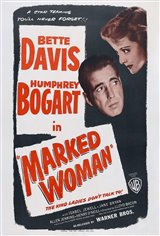
Marked Woman (1937)
Marked Woman (1937)
Bette Davis' famous walk-out from her home studio of Warner Bros. may have hurt her financially, but in the long run it paid off with bigger parts in better films. Like many Warners films of the period, Marked Woman was torn from today's headlines. Specifically, it was inspired by the recent downfall of gangster Lucky Luciano, who at one time controlled all prostitution activities in New York. The ladies herein are euphemistically characterized as night club hostesses, but when Luciano look-alike Johnny Vanning (Eduardo Cianelli) shows up at a fancy clip-joint to give the girls their marching orders, the audience can tell exactly what's going on. Been-there-done-that hostess Mary (Davis) is no better than she ought to be, though she has a definite code of honor; she stands up to the dictatorial Vanning at every opportunity, fending of his amorous attentions and seeing to it that her over the hillcolleague Estelle (Mayo Methot) is retained on the gangster's payroll. At the same time, Mary tries to shield her seedy profession from her virginal sister Betty (Jane Bryan), but the girl discovers the truth and becomes a B-girl herself, a rash move that results in her death. Previously frightened into silence by periodic beatings from Vanning's goons, Mary and four of her girlfriends become state's witnesses, providing testimony to crusading District Attorney David Graham (Humphrey Bogart, playing a character clearly patterned after Thomas E. Dewey). A last-ditch effort to permanently stifle Mary and her friends fails, and the ladies show up in court to put the noose around Vanning's neck.
| Cast: | Bette Davis, Humphrey Bogart, John Litel, Allen Jenkins, Robert Strange, Mayo Methot, Raymond Hatton, Henry O'Neill, Ben Welden, John Sheehan, Eduardo Ciannelli, Isabel Jewell |
| Director: | Lloyd Bacon |
| Studio: | Warner Bros. Pictures |
